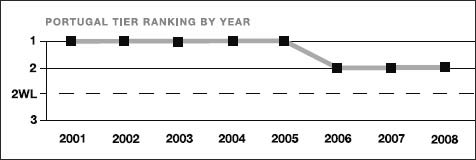Trafficking in Persons Report 2008 - Portugal
| Publisher | United States Department of State |
| Author | Office to Monitor and Combat Trafficking in Persons |
| Publication Date | 4 June 2008 |
| Cite as | United States Department of State, Trafficking in Persons Report 2008 - Portugal, 4 June 2008, available at: https://www.refworld.org/docid/484f9a37c.html [accessed 7 June 2023] |
| Disclaimer | This is not a UNHCR publication. UNHCR is not responsible for, nor does it necessarily endorse, its content. Any views expressed are solely those of the author or publisher and do not necessarily reflect those of UNHCR, the United Nations or its Member States. |
PORTUGAL (Tier 2)
Portugal is primarily a destination and transit country for women, men, and children trafficked from Brazil, and to a lesser extent, from Ukraine, Moldova, Russia, Romania, and Africa for the purpose of commercial sexual exploitation and forced labor. Male victims from Eastern European countries are trafficked for forced labor into the farming and construction industries. Some trafficking victims transit through Portugal to other European countries.
The Government of Portugal does not fully comply with the minimum standards for the elimination of trafficking; however, it is making significant efforts to do so. The government made significant progress in its law enforcement response to trafficking by incorporating anti-trafficking legislation in its penal code, demonstrating significant improvements in coordination among its agencies, and greatly improving its collection of comprehensive antitrafficking law enforcement data. However, nearly all traffickers convicted during the reporting period were given suspended sentences and not required to serve time in jail.
Recommendations for Portugal: Ensure convicted trafficking offenders receive prison sentences commensurate with the heinous nature of the offense committed; continue to implement procedures to proactively identify trafficking victims, and consider providing data on the number of victims identified and who accept assistance; and conduct specific anti-trafficking prevention training for military personnel going abroad.
Prosecution
The Government of Portugal strengthened its penal code in 2007 to broaden the definition of trafficking in Portugal and increased prescribed penalties for traffickers. Portugal prohibits transnational and internal trafficking in persons for both labor and sexual exploitation through Article 160, which prescribes penalties that are sufficiently stringent and commensurate with those for other serious crimes. Notably, the penal code revisions provide for criminal punishment for labor recruiters in source countries whose knowing use of fraudulent or deceptive offers result in workers being trafficked in the destination country. Despite these legislative improvements, punishments imposed by Portuguese courts continue to be inadequate; the majority of traffickers' sentences are suspended. According to the latest statistics available, the government prosecuted 65 traffickers in 2006. Out of 49 convicted trafficking offenders, only eight actually served any jail time, with 38 receiving suspended sentences and three receiving fines. There were no reported cases of government officials complicit in trafficking.
Protection
The Government of Portugal sustained its efforts to protect trafficking victims throughout the reporting period. Victims are allowed a 30-60-day reflection period to decide whether or not they wish to press charges against traffickers and, regardless of their decision, they have the right to a one-year residency permit. Once detained and identified by authorities, victims reportedly are transferred to shelter facilities and do not face penalties for unlawful acts committed as a direct part of their being trafficked. Police continued to receive training on how to recognize trafficking victims and are required to fill out a standard detailed form with information when they encounter suspected trafficking cases. The government reported that police counsel all potential victims on the assistance available to them, including legal and medical remedies. The government reported that few trafficking victims opted to receive protection and assistance from NGOs and the government shelter – only 10 received assistance in 2007. The government's 20 immigrant support centers located throughout the country provide ad hoc support services to approximately 1,200 immigrants a day, a figure that reportedly includes trafficking victims. The government reported it distributed anti-trafficking pamphlets at these centers to potential trafficking victims. The government continued to fund the majority of costs for an NGO-run shelter, and provided a fixed subsidy for each victim, including their children, for another.
Prevention
The Government of Portugal continued its proactive efforts to prevent trafficking in 2007. For example, in November 2007, the Foreigners and Borders Service (SEF), in cooperation with the Council of Europe, launched the campaign, "You are not for Sale" and SEF teams traveled throughout the country and to Brazil to disseminate and publicize the campaign. The government took some steps to reduce demand for commercial sex acts by sponsoring awareness campaigns that incorporated anti-demand aspects. In an additional effort to reduce demand, the government amended its criminal code in 2007 to provide specific penalties for clients who knowingly procure the services of a trafficking victim for sexual purposes. Although the Government of Portugal contributes troops to international peacekeeping efforts abroad, it did not conduct specific anti-trafficking prevention training targeted at its military. While there is no specific evidence that Portugal is a source or destination for child sex tourism, the government did not take any discernable steps to raise awareness among or prevent its nationals from engaging in child sex tourism abroad.

